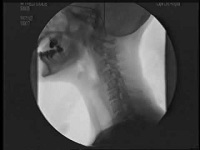Main ContentFive Facts about Modified Barium Swallow Studies
By Kimbrell Kimbrell Evans, MS, CCC-SLP Speech Language Pathologist
First of all, what is an MBSS? An MBSS stands for “modified barium swallow study”. This test can also be called a VFSS, which stands for “videofluoroscopic swallow study”. An MBSS is an X-ray procedure performed in the Radiology department that looks at the anatomic structures in your head and neck area to make sure they are working properly while you are chewing, drinking and swallowing. An MBSS also determines whether or not you are aspirating, which is when food or liquid enters into your lungs, or “goes down the wrong way.”
Why do I need an MBSS? The most common reasons for ordering this test are patient complaints/symptoms of:
- coughing and/or choking while eating and/or drinking
- increased time to complete meals
- unexplained weight loss
- globus sensation, the sensation that foods or liquids are stuck in your throat
- uncontrolled reflux
- known or suspected aspiration pneumonia
- masses on tongue, pharynx or larynx
- muscle weakness involving any of the anatomical swallowing structures
- neurologic disorders likely to affect swallowing (i.e. ALS, Myasthenia Gravis, Cerebral Palsy, Multiple Sclerosis, CVA, TBI)
All of these are signs of dysphagia, the medical term for “trouble swallowing”
How does an MBSS work? With an MBSS, you will be asked to sit in a standard chair in front of a big fluoroscopy camera that converts X-rays into video images. These images are recorded on a DVD for reviewing after the test is over. Your SLP will guide you through the exam and may ask you to change your body position to aid in swallowing. You will be given various amounts and consistencies of barium, a contrast material, to eat and drink while the SLP watches you in real time while the camera focuses in on your head and neck area. Barium does not taste bad, just a little chalky like liquid medicine. An MBSS does not take long and averages around 15-30 minutes from start to finish.
How can I prepare for an MBSS? Although most radiology procedures that view the digestive tract at any point in the body restricts you from eating on the day of the procedure, this is not necessary with a MBSS and you may eat, drink, and take medications before your test. However, you may not want to eat too much before the test because you will be consuming barium during the procedure. You should also inform the SLP if you have any allergies, especially to iodinated contrast materials. Allergic reactions to barium are extremely rare. Also, please refrain from wearing jewelry, any metal objects or clothing (ex. a shirt with a large metal zipper or metal buttons) that may interfere with fluoroscopy. Lastly, women should always inform the SLP or X-Ray technologist if there is any possibility that they are pregnant.
How will I know if I “passed” the MBSS? While this test is not “pass or fail”, you will most likely know how well you did on an MBSS immediately following. When the MBSS is over, the SLP will meet with you to discuss the results of the examination and will also send a finalized report to your referring physician. In some cases, follow up examinations are needed. Additional tests may be ordered if there is a questionable finding that may need clarification with additional views/imaging. Also, if necessary, your SLP will inform you if any follow up treatment is recommended (i.e. dysphagia therapy) or if you need to alter your diet to make it safer for you to swallow.